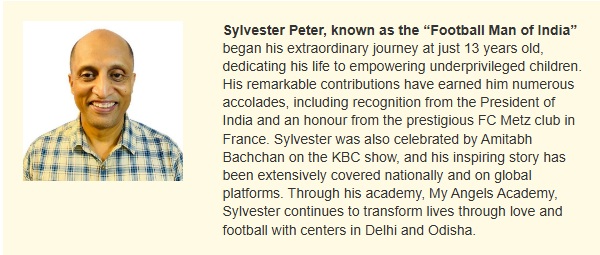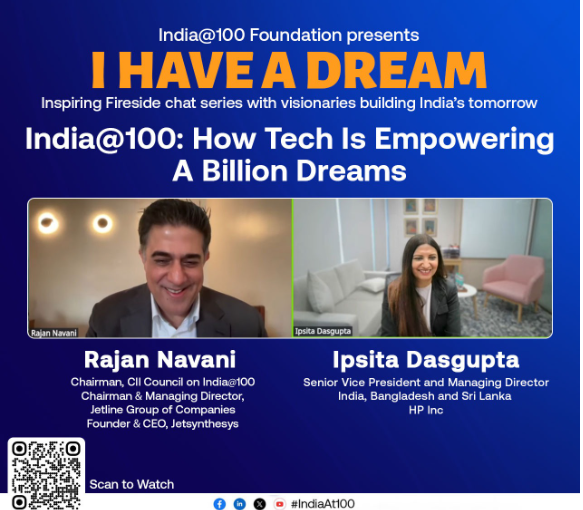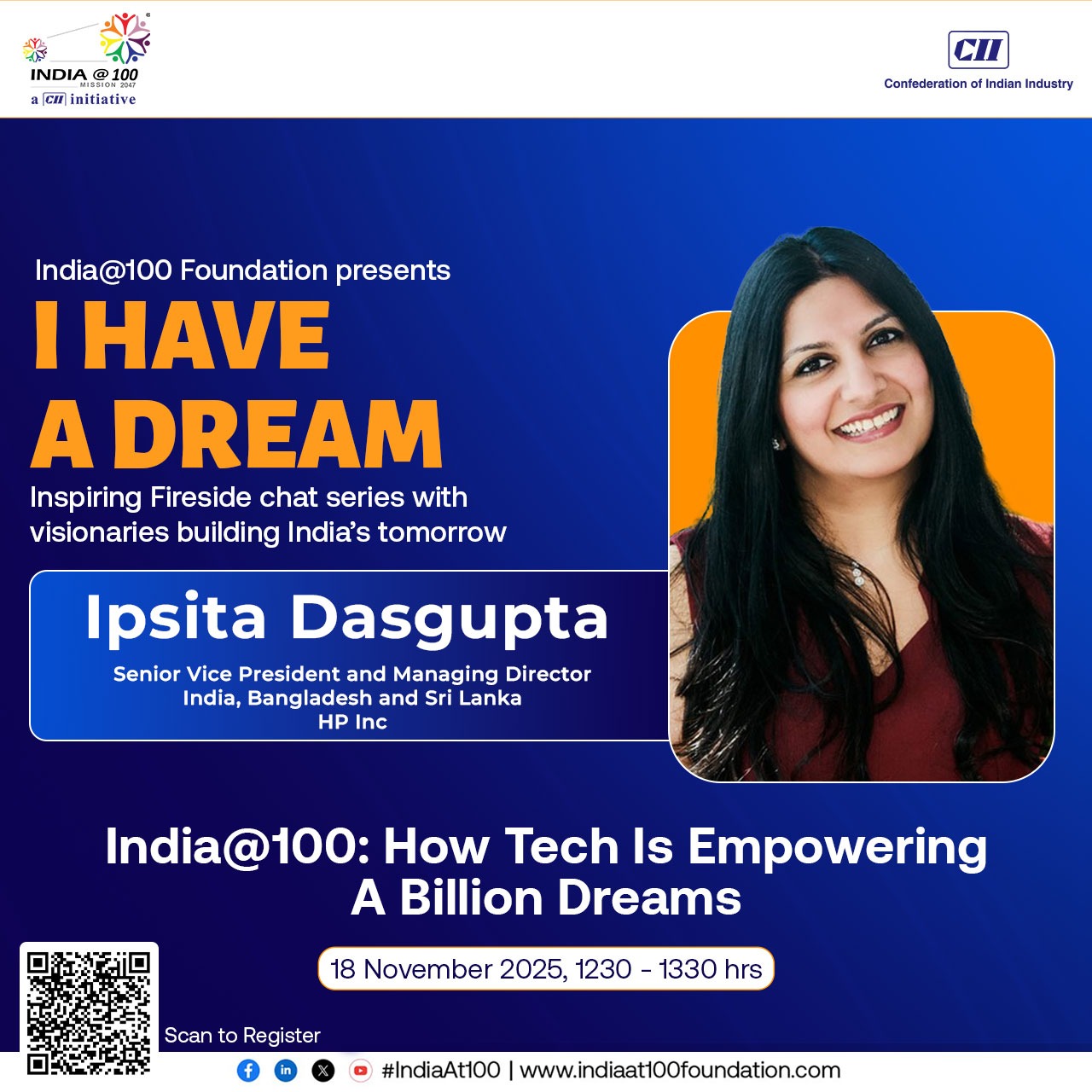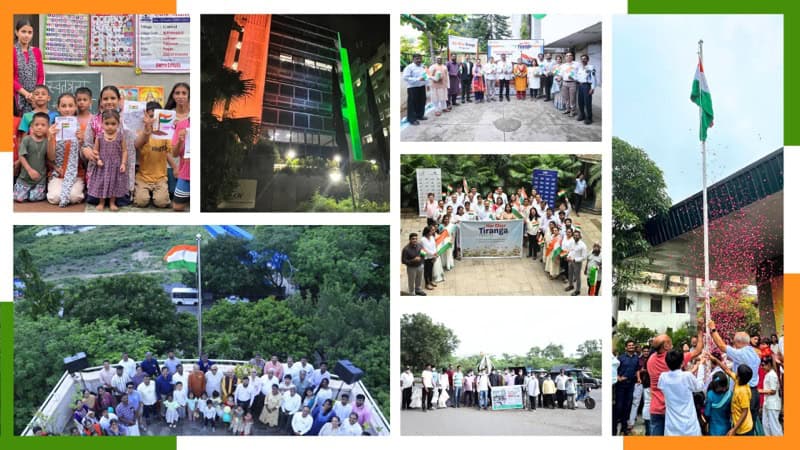
You founded My Angels Academy at just 13—a transformational step at such a young age. What moments or experiences inspired you to believe that change can begin early and from within?
I was born in Chennai but raised in Delhi, where my schooling took place. Determined to keep me connected with our Tamil roots, my mother enrolled me in the Delhi Tamil Education Association School. Unlike the well-equipped schools many of my cousins attended, mine had minimal infrastructure—our early classes were held under tents. I was reluctant at first, unaware that this experience would profoundly shape my life.
Most of my classmates came from economically disadvantaged families. I naturally bonded with them through a shared love of outdoor play, especially football. One day, in Class 4, a friend came to school looking unusually neat. When I asked why, he quietly said, “It’s my birthday.” I expected stories of cake and balloons, but he explained that his celebration consisted of sweet Pongal, a temple visit, and an oil massage—no party, no presents. I assumed his parents were unloving. When I expressed this at home, my mother gently opened my eyes to the reality of poverty. “You check the fridge when you come home,” she said. “Your friend checks empty utensils for food.” That truth pierced me. From then on, I began sharing my lunch, often going hungry myself. Gradually, I started sharing more books, toys, and care, and became a mentor to my friends. That was the beginning of My Angels Academy—a place rooted in love, where every child is seen as an Angel, and where true change begins not with age or wealth, but with empathy, awareness, and action.
You’ve beautifully woven sports—especially football—into the fabric of learning. How do these experiences on the field empower children to face life with confidence, discipline, and teamwork?
At My Angels Academy, football is not just a game—it is the sun that lights up every child’s world. It brings warmth, purpose, structure, and joy to children who grow up in communities where hope is scarce. Many of our Angels arrive with low self-worth, shaped by poverty, neglect, and social stigma. On the field, they begin to reclaim their identity. Football instils discipline through routine and confidence through resilience. The pitch becomes a classroom where children learn to rise after every fall. Every pass, every cheer, every goal fosters teamwork, communication, and mutual respect. The game teaches them that they are not alone—that progress is built collectively.
What sets our approach apart is that football is never detached from values. We reward not only performance, but kindness, empathy, proactiveness, and gratitude. Children learn that love is earned, not through talent alone, but through character. We address each student as an Angel—Komal Angel, Poonam Angel—because we see their spirit and potential. Hygiene, gender equality, and dignity are woven into our routines. Girls play alongside boys, their voices respected equally. Cleanliness is celebrated. The field becomes a space where respect and equality are non-negotiable. These lessons don’t end at the final whistle. They ripple through the classroom, into families, and into communities. Football gives our Angels the courage to dream, the strength to persevere, and the heart to serve. They emerge not just as players but as leaders of change—resilient, compassionate, and ready to face life with grace.

As we build a more inclusive and equitable India, what forward-looking policy actions can ensure that children in informal settlements grow with dignity, opportunity, and hope?
To build a more inclusive India, we must first uphold the idea that dignity is not a privilege—it is a right. Children in informal settlements deserve more than survival; they deserve meaningful growth. They are not problems to be fixed, but potential to be nurtured. Policy must begin by prioritising holistic education—one that blends academics with emotional intelligence, life skills, and character-building. Children must be taught empathy, gratitude, teamwork, and self-respect alongside literacy. Programmes like ours, which use football and mentorship to instil these values, have shown how transformative such learning can be. We must ensure clean, safe, inclusive spaces for learning and play. Sanitation, nutrition, and mental health should not be afterthoughts—they are foundations. At My Angels Academy, the simple act of providing a clean football kit has changed how children see themselves. Dignity breeds discipline. Respect grows where it is given.
Policies must also support grassroots educators and community organisations that already have the trust of local families. Rather than replace these efforts with large-scale systems, governments and institutions should strengthen and replicate them with care, funding, and flexibility. Gender equality must be embedded across all interventions. Every girl should have the same access to sport, education, and leadership as her male counterparts.
Finally, access to digital tools, mentorship, and safe environments must be guaranteed to every child. When policies are driven not just by numbers, but by compassion, we create an India where every child can grow up not in fear, but in hope—and with the confidence to soar.
India@100 is a vision that belongs to every child. How can we create stronger ecosystems that support and scale inspiring grassroots models across communities and cities nationwide?
India@100 is not merely a celebration of longevity—it must reflect the strength, dignity, and dreams of its youngest citizens. To realise this vision, we must invest in grassroots models that already embody the change we wish to see.Organisations like My Angels Academy are built on relationships, trust, and lived experience. We do not function with massive infrastructure, but with deep emotional structure. Our strength lies in love, consistency, and local understanding. To scale such models, we must nurture ecosystems that preserve their soul while amplifying their reach.Support should be adaptive, not restrictive. Policies and funding mechanisms must allow grassroots organisations the freedom to innovate. Capacity-building, mentorship, and knowledge-sharing should be prioritised over mere compliance. Most importantly, these organisations must be seen not as beneficiaries of support, but as equal partners in progress.
We must build stronger connections between the government, corporates, NGOs, and citizens to foster co-created ecosystems. Collaborative platforms can allow community models to grow without losing authenticity.
Let us also centre children’s voices. The Komal Angels and Poonam Angels of this country must be heard—not just as recipients, but as contributors. Their stories, struggles, and solutions hold power. Sport, Karma Yoga, and Art have proven to be a unifier. It can be used to replicate not just programmes, but cultures of dignity, gender equality, and teamwork across the country.
India@100 will be meaningful when our development models are not built for communities, but with them. When every child sees themselves reflected in the nation’s dream, we will know we are truly moving forward.
India’s youth hold incredible potential to shape the nation’s future. What empowering message would you like to share with the young generation in the journey to India@100?
To the youth of India—your potential is immense, and your moment is now. You are not preparing for the future; you are already building it. Every choice you make, every voice you raise, shapes the India we are becoming.
In today’s fast-moving world, it is easy to chase success through numbers—marks, likes, awards. But I urge you to seek meaning alongside achievement. Lead not only with ambition, but with compassion. Use your strength to lift others, your privilege to serve, your pain to build purpose.
At My Angels Academy, we call every child an Angel—not because they are flawless, but because they rise with grace, courage, and gratitude. Be that Angel in your own world. Share whatever you can, things or Knowledge. Encourage your peers. Speak up when it matters. Stand beside someone who feels invisible.True leadership is built not on applause, but on action. The world needs your ideas—but more than that, it needs your integrity.India@100 should not only be remembered for economic growth or technological advancement. Let it be celebrated as a nation where youth shaped a culture of empathy, inclusion, and service. Let it be known that we raised not just brilliant minds, but brave hearts. You have within you the ability to move hearts, shift systems, and light the way. Believe that your journey matters. Act with love. Lead with courage. And remember: even a 13-year-old can spark a revolution of hope—so why not you.




